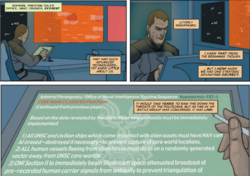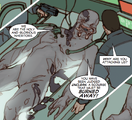Cole Protocol: Difference between revisions
From Halopedia, the Halo wiki
m (→Article 1) |
No edit summary |
||
| Line 28: | Line 28: | ||
:'''[[Encryption code|Encryption Code]]:''' Red | :'''[[Encryption code|Encryption Code]]:''' Red | ||
:'''Public Key:''' file/ First light/ | :'''Public Key:''' file/ First light/ | ||
:'''From:''' UNSC/NAVCOM Fleet [[H.T. Ward]] | :'''From:''' UNSC/NAVCOM Fleet [[H. T. Ward]] | ||
:'''To:''' ALL UNSC PERSONNEL | :'''To:''' ALL UNSC PERSONNEL | ||
:'''Subject:''' General Order 098831A-1 ("The Cole Protocol") | :'''Subject:''' General Order 098831A-1 ("The Cole Protocol") | ||
Revision as of 13:00, April 12, 2021
| This article does not have enough inline citations and/or does not adhere to the proper citation format. You can help Halopedia by adding citations. |
- "It would take years to ram this down the throats of the politicians, but as far as my battle group was concerned it was law."
- — Admiral Cole on his first draft of the Cole Protocol.[1]
Emergency Priority Order 098831A-1, also called General Order 098831A-1 and known commonly as the Cole Protocol, was a United Nations Space Command directive enacted by Admiral Preston Cole to prevent the Covenant from discovering the human homeworld and colonial capital, Earth, or any other inner colony world. In practice, it was intended to prevent Covenant's retrieval of data that contained the location of Earth; it forbade retreating vessels from setting a direct slipspace course toward any human population center, as the Covenant were able to track slipspace travel vectors and calculate the evacuating ship's destination. The policy also stated that to prevent capture, any military or civilian vessel, in the event of an emergency evacuation, was to self-destruct, after wiping all data matrices, to prevent the advance of the Covenant.
All UNSC personnel were commanded to read the Cole Protocol each day "by the letter" under an emergency transmission issued by the Naval Command. The Cole Protocol ensured that in nearly twenty-seven years of interstellar warfare, the Covenant never discovered the human presence on Earth, and only found other population centers either by accident, by tracking devices left aboard ships,[2] or by the presence of Forerunner artifacts via Luminary.[3] Unfortunately, the Cole Protocol ceased to be effective when, on October 20, 2552, Covenant forces invaded Earth; however, the protocol presumably remained in effect for the other remaining Inner Colonies.
Hypodermic-FXT-J
Hypodermic-FXT-J contained the basic instructions set in the final draft of the first articles of the Cole Protocol.[1] The report's contents are as follows:
Admiral Parangosky/Office of Naval Intelligence/Routing Sequence: Hypodermic-FXT-J
CODE NAME CLASSIFIED: Pied Piper
(Continued from previous page)...
Based on the data revealed by the alien, these new protocols must be immediately implemented:
- All UNSC and civilian which come in contact with alien assets must have NAV computer/AI erased—destroyed if necessary—to prevent capture of core world locations.
- ALL Human vessels fleeing from alien forces must do so on a randomly generated vector away from UNSC core world locations.
- ONI Section II to immediately begin Slipstream space attenuated broadcast of pre-recorded human carrier signals from antiquity to prevent triangulation of Earth.[4]
The protocol
Article 1
- United Nations Space Command Emergency Priority Order 098831A-1
- Encryption Code: Red
- Public Key: file/ First light/
- From: UNSC/NAVCOM Fleet H. T. Ward
- To: ALL UNSC PERSONNEL
- Subject: General Order 098831A-1 ("The Cole Protocol")
- Classification: RESTRICTED (BGX Directive)
- The Cole Protocol
- To safeguard and protect the Inner Colonies and Earth, all UNSC vessels or stations must not be captured with intact navigation databases that may lead Covenant forces to human civilian population centers.
- If any Covenant forces are detected:
- 1. Activate selective purge of databases on all ship-based and planetary data networks.
- 2. Initiate triple-screen check to ensure all data has been erased and all backups neutralized.
- 3. Execute viral data scavengers (Download from UNSCTTP://EPWW:COLEPROTOCOL/Virtualscav/fbr.091)
- 4. If retreating from Covenant forces, all ships must enter Slipstream space with randomized vectors NOT directed toward Earth, the Inner Colonies, or any other human population center.[note 1]
- 5. In case of imminent capture by Covenant forces and boarders, all UNSC ships MUST self-destruct.[note 2]
- Violation of this directive will be considered an act of TREASON and pursuant to UNSC Military law articles JAG 845-P and JAG 7556-L, such violations are punishable by life imprisonment or execution.
Article 2
Destruction or capture of a shipboard AI is absolutely unacceptable.
- "Alright then. I'm initiating Cole Protocol, Article 2. We're abandoning the Autumn. That means you too, Cortana."
- — Captain Keyes initating the Article 2 Protocol.[5]
Article 2 mandates the procedure for erasing a ship's data, primarily navigation data, as well as all backups, in case of potential compromise by the Covenant. In such situations, a ship-board artificial intelligence must be secured; if extraction is not possible, the AI must be purged. It is possible that Article 2 also governs protocol in terms of abandoning a vessel giving the terms that someone need to extract the AI out of the ship for safety if possible.[5][6]
Subsection 7
No captured Covenant craft may be taken to human controlled space without an exhaustive search for tracking systems that could lead the Covenant to Human bases.
Subsection 7 dictates that captured Covenant matériel and ships may not be taken back to human-controlled space due to concerns that they might contain tracking devices; as such, it is likely part of Article 4. Bringing a Covenant weapon back to any UNSC installation or Inner Colony is considered an act of treason.[7] SPARTAN-III Emile-A239 possessed a large collection of contraband Covenant equipment which he acquired in the field. While possessing this matériel was a gross violation of Subsection 7, his superior, UNSC Army Colonel Urban Holland, refused to report the Spartan; Holland claimed that the Army does not need to follow Navy protocol. The SPARTAN-IIs had standing orders from the Office of Naval Intelligence to seize Covenant weapons and technology whenever possible.[8]
Few have even heard of Subsection 7; it was little more than a technicality before Ascendant Justice was captured by SPARTAN John-117 and his team soon after the Battle of Installation 04. This was due to the chances of capturing even a severely crippled Covenant ship being minuscule, as the ship's crew would usually activate their self-destruct function before the completion of such attempts. Because Ascendant Justice could not be thoroughly searched, John-117 and ONI Lieutenant Elias Haverson instead planned to take the ship to Reach, which had already been compromised by the Covenant, and then try to return with a better prepared team.[9]
Notes
- ^ Following the Fall of Reach, Lieutenant Wagner defied Article 4, initiating a slipspace jump straight to Earth in order to warn HIGHCOM of Reach's fate as quickly as possible. No punitive action was taken against him.
- ^ During the Battle of Installation 04, Captain Keyes and the Pillar of Autumn were captured by the Covenant and Monitor 343 Guilty Spark was able to obtain information about human history and the location of Earth from the ship's records.
Gallery
- Cole.jpg
Admiral Preston Cole, creator of his titular protocol.
- ColeWritingProtocol.png
Preston Cole writing Hypodermic-FXT-J, the progenitor of the Cole Protocol.
List of appearances
- Halo: The Fall of Reach (First appearance)
- Halo: Combat Evolved
- Halo: The Flood
- Halo: First Strike
- Halo 2
- Conversations from the Universe (Indirect mention)
- Halo: The Cole Protocol
- Halo Wars: Genesis (As Hypodermic-FXT-J)
- Halo Legends
- Prototype (Mentioned only)
- Halo: Evolutions - Essential Tales of the Halo Universe
- The Mona Lisa (Mentioned only)
- The Impossible Life and the Possible Death of Preston J. Cole
- The Return (Mentioned only)
- Halo: Fall of Reach
- Halo: Combat Evolved Anniversary
- Halo: New Blood (Mentioned only)
- Halo: Fleet Battles (Mentioned only)
- Halo Mythos (Mentioned only)
Sources
- ^ a b Halo Wars: Genesis, p. 8
- ^ Halo: The Fall of Reach, Chapter 23, page 216 (2001 paperback); page 247 (2010 paperback)
- ^ Youtube - Halo 2: Anniversary Prologue Terminal 1 - Beholden
- ^ Halo: Evolutions - Essential Tales of the Halo Universe, The Impossible Life and the Possible Death of Preston J. Cole, Section Six: The Covenant War: The Cole Campaigns (2525-2532 CE)
- ^ a b Halo: Combat Evolved, campaign level The Pillar of Autumn
- ^ Halo: The Flood, Chapter 1
- ^ Halo: The Cole Protocol, Chapter 10
- ^ Halo: The Fall of Reach, Chapter 20
- ^ Halo: First Strike, Chapter 9

